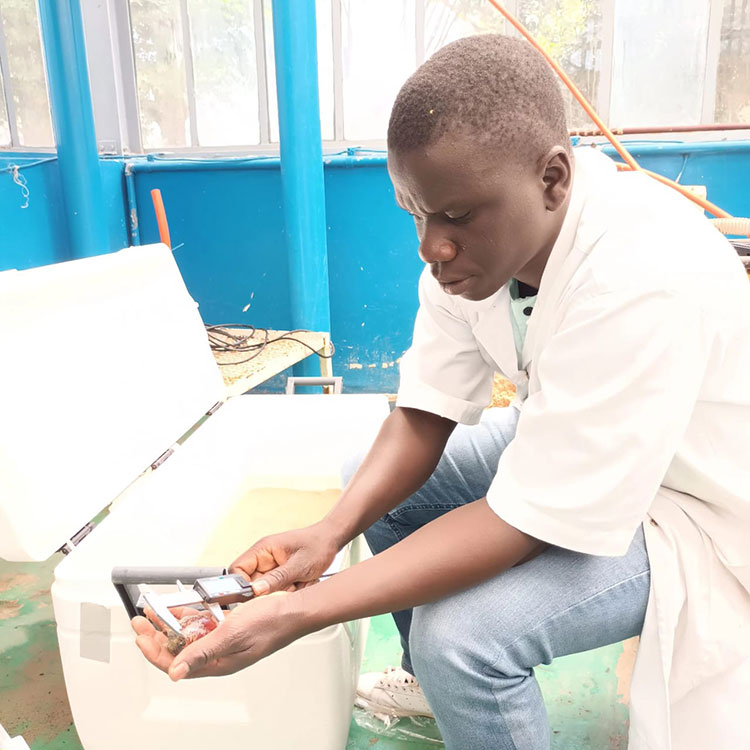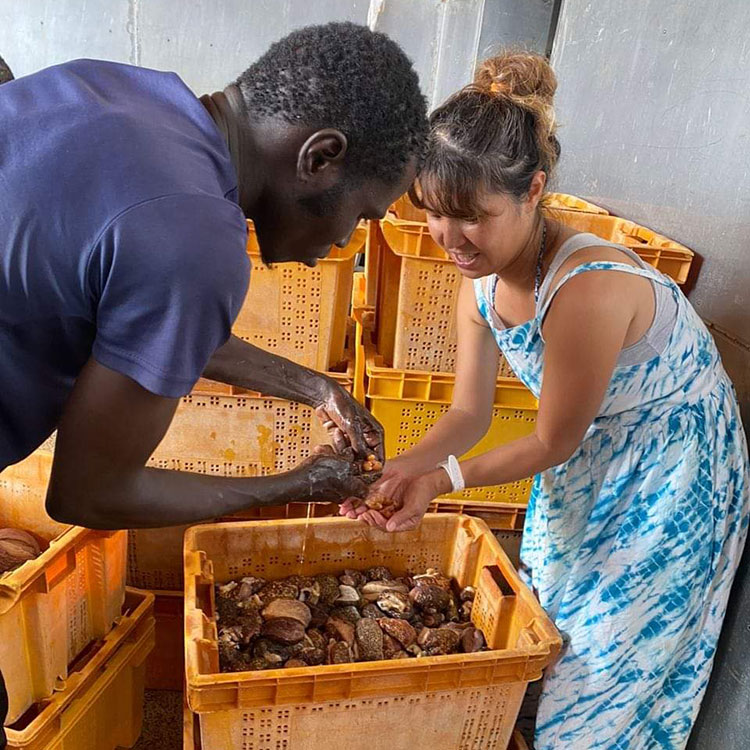2.5 Enhancing collaboration within the fisheries value chain
Resource management activities enhance the effectiveness of fisheries regulations, such as no-fishing seasons and fish size limits, by deepening collaboration with fish processors and exporters (hereafter referred to as ‘fishing enterprises’) in the fisheries value chain. Despite an established no-fishing season, if fishing enterprises propose purchasing fishery products during the closed season, fishermen may continue to fish to maintain their livelihoods. Therefore, resource management organisations should work with administrations to organise meetings with fishing companies to establish a mutually beneficial relationship between fishermen and fishing companies and enhance the effectiveness of the resource management activity.
5. National Organisation of Fisheries Value Chain Associations in Senegal
As a measure to strengthen the fisheries value chain, the Government of Senegal created the Commission Nationale dAppui' à l'Aménagement' de la Pêcherie (CNAAP) by Ministerial Order 07397 of 19 May 2016. The CNAAP is a consultative body composed of the Ministry of Fisheries and Maritime Economy, sectoral associations, such as CRODT, UPAMES and GAIPES, and CLPAs, throughout the territory to support fisheries resource management. By involving relevant organisations encompassing all stages of the value chain, from catching and landing to distribution, processing and export, the CNAAP, in collaboration with the National Executive Bureau of the CLPA Network, provides a discussion platform aimed at promoting the overall management of fisheries resources at the national level.
The following are some of the ways in which stakeholders in the fisheries, distribution, processing, and export sectors of the fisheries value chain can strengthen their collaboration around resource management organisations with the support of the Fisheries Directorate, local authorities, donors, and others.
- Find partner companies and ask them to cooperate in the activities
- Look for ways to build a win-win relationship
- Formally request concrete cooperation from fishing companies
Find partner companies and ask them to cooperate in the activities.
Resource management organisations compile a list of fishing companies that buy, process, and export fish produced in the target fishing village; collect information with the support of the Fisheries Directorate, local authorities, and donors; and approach these companies to cooperate in resource management activities. They then visit these businesses to explain the content of the resource management activities, emphasising the importance of their role in improving the efficacy of the resource management activities, and request their cooperation.
Look for ways to build a win-win relationship.
Leaders of fishing villages and government officials ask fishing enterprises to share information on the size and freshness of products sought by fishing enterprises, the quality of raw materials that are not eligible for export, and the percentage of these materials to improve the added value of fishery products produced by fishermen. They listen to the needs of fishing enterprises, such as improving the freshness and size of fishery products, examine what fishermen can do to meet these needs, and make proposals to fishing enterprises. If meeting these needs increases production costs, they negotiate with the fishery companies on[1] the purchase price of fish products in the fishing village.
On the day after the no-fishing season and the days of activities for the reproduction of resources (e.g. the day of dumping octopus pots for spawning), the director of the administration and representatives of relevant organisations are invited for a ceremony on resource management. On these occasions, the name of the partner company can be included in newspapers and other media and the Fisheries Directorate can commend their social contributions by giving them awards, which motivates the company to cooperate further. By examining these means, fishing companies and fishermen can build a win-win relationship.
16. History of strengthening collaboration within the fisheries value chain in Senegal
In Senegal, the involvement of stakeholders in the fisheries value chain, such as fish exporters and the Directorate of Fisheries Processing Industries (DITP) overseeing them, in fisheries resource management has led to effective and sustainable resource management activities.
Formally request concrete cooperation from fishing companies.
After understanding the business situation, fishing village leaders and government officials request cooperation from fishing businesses; for example, to ask them not to purchase target fish during the no-fishing season. They can also ask for financial support from fishing companies for activities that they consider effective in restoring and increasing the targeted fish resources, such as the installation of spawning reefs and habitat conservation.
17. Appreciation of a partner company for the collaboration in resource management
The PROCOVAL project implemented by JICA in 2014–2017 established fisheries authorities’ collaborative relationships for fisheries resource management with several private fishing companies. Among these, BLUE FISH values its collaborative relationship, which has resulted in high-quality fisheries products and the sustainability in their production.


1. In this case, the price negotiations with the fisheries companies would be made by the fishermen leaders who are members of the resource management organisation or leaders of professional groups. The price negotiated with the fishing companies would then be reflected in the selling price to the fishmongers in the fishing village.